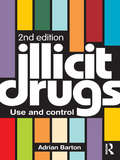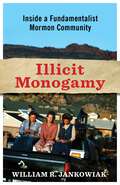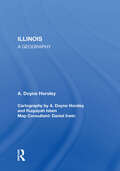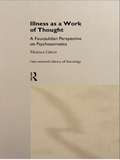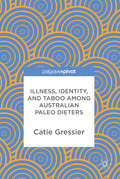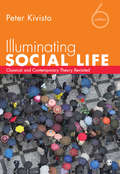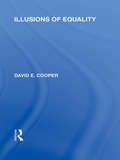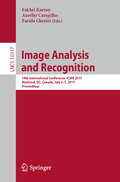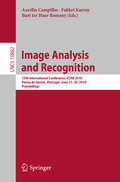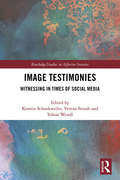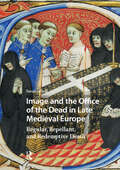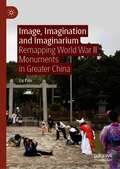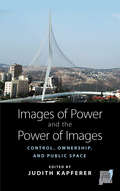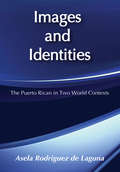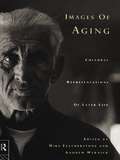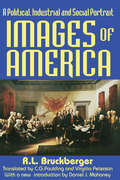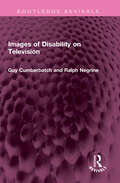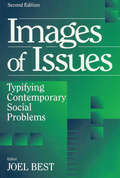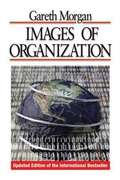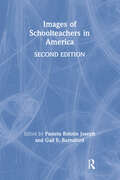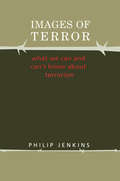- Table View
- List View
Illicit Drugs: Use and control
by Adrian BartonIllicit drugs and their use are a dominant concern of politicians, policy makers and the general public. As such, this second edition of the popular Illicit Drugs: Use and Control provides a timely, up-to-date discussion of the key issues raised in the first edition, whilst also providing new chapters which address: Class, gender and race The geo-politics of illicit drug production and distribution Britain’s drug use within a global context Drawing information from wide-ranging sources, Adrian Barton illuminates the complex nature and broad impact illicit drug use carries in its wake and provides an overview of the contemporary state of the drug 'scene'. This accessible book, with its inclusion of new pedagogical features, will be essential reading for students and researchers working in the area of drugs and society.
Illicit Monogamy: Inside a Fundamentalist Mormon Community
by William JankowiakAngel Park is a Mormon fundamentalist polygamous community where plural marriages between one man and multiple women are common. In contrast to mainstream America’s idealization of the nuclear family and romantic love, its residents esteem notions of harmonious familial love, a spiritual bond that unites all family members. In their view, polygyny is not only righteous and sanctified—it is also conducive to communal life and social stability.Based on many years of in-depth ethnographic research in Angel Park, this book explores daily life in a polygamous community. William R. Jankowiak considers the plural family from the points of view of husbands, wives, and children, giving a balanced account of its complications and conflicts. He finds that people in polygynous marriages, especially cowives, experience an ongoing struggle to balance the longing for romantic intimacy with the obligation to support the larger family. They feel tension between deeply held religious convictions and the desire for emotional exclusivity, which can threaten the stability and harmony of the polygamous family. Men and women often form exclusive romantic pairs within plural marriages, which are tolerated if not openly acknowledged, showing the limits of the community’s beliefs. Jankowiak also challenges stereotypes of polygamous families as bastions of patriarchal power, showing the weight that interpersonal and social expectations place on men.Offering an unparalleled look at the complexity of a polygamous religious community, Illicit Monogamy also helps us reconsider relationships, love, and family dynamics across cultures and settings.
Illinois: A Geography
by A. Doyne HorsleyHorsley focuses on the contrasting environments within the state of Illinois and on the interactions of the inhabitants with their surroundings. He uses a standard Progressing from the physical and historical factors, through economic activities, concluding with chapters on Chicago and its suburbs. The text includes an urban-rural traverse across the state and a series of maps on presidential voting records by counties, 1960 to 1984.
Illness as a Work of Thought: A Foucauldian Perspective on Psychosomatics (International Library of Sociology #No.11)
by Monica GrecoIllness as a Work of Thought is a practical application of Foucault's archaeological and genealogical methods of the study of illness and modernity. From medicine and psychiatry to psychology and the social sciences, Monica Greco explores what the history of these different disciplines contributes to what we understand by the term 'psychosomatics' and analyses how the study of psychosomatic illness can transform the way we think of illness, subjectivity and the ethics and politics of health.
Illness, Identity, and Taboo among Australian Paleo Dieters
by Catie GressierThis book explores the cultural and economic conditions fuelling the popularity of the polarizing Paleo diet in Australia. Based on ethnographic research in Melbourne and Sydney, Catie Gressier recounts the compelling narratives of individuals struggling with illness and weight issues. She argues that 'going Paleo' provides a sense of agency and means of resistance to the neoliberal policies and practices underpinning the growing prevalence of lifestyle diseases. From its nostalgic constructions of the past, to the rise of anti-elite sentiments inherent in new forms of health populism, Gressier provides a nuanced understanding of the Paleo diet's contemporary appeal.
Illuminating Social Life: Classical and Contemporary Theory Revisited
by Peter KivistoThe sixth edition of Peter Kivisto's popular anthology, Illuminating Social Life, continues to demonstrate to students how social theories can help them make sense of the swirling events and perplexing phenomena that they encounter in their daily lives. A perfect complement for sociological theory courses, this updated edition includes 13 original essays by leading scholars in the field that help students better understand and appreciate the relevance of social theory. Once again, Peter Kivisto's collection illuminates the connection between sociological theory and the realities that students are faced with every day —from the Internet, alcohol use, and body building to shopping malls, the working world, and fast-food restaurants
Illuminating Social Life: Classical and Contemporary Theory Revisited (3rd Edition)
by Peter KivistoHow classical and contemporary social theories are used to shed light on the internet, fast food restaurants, shopping malls, and other new topics.
Illuminating the Path to Vibrant American Jewish Communities: Linking Data to Policy (Studies of Jews in Society #4)
by Jacob B. UkelesThis book argues that the way to ensure that American Jewish life flourishes is to create vibrant local communities and that the ability to thrive will be won or lost in the trenches of each locality. For every generalization about the Jews of America, one can say, “maybe, but it depends where.” In the United States, Jewish life is up close and personal where local variations on national themes make a huge difference. The author presents case studies using in-depth analysis of data from nine Jewish community studies to illuminate eleven critical American Jewish policy issues. The analysis is used to formulate a range of policy options for different types of communities. This book is for anyone who cares about the future of American Jewry. It should be of particular interest to the lay leaders and professionals who play a role in Jewish nonprofits. It is also of great interest to researchers and students of Jewish studies and Jewish communal service.
Illusions of Equality (International Library Of The Philosophy Of Education)
by David CooperEducational policy and discussion, in Britain and the USA, are increasingly dominated by the confused ideology of egalitarianism. David E. Cooper begins by identifying the principles hidden among the confusions, and argues that these necessarily conflict with the ideal of educational excellence - in which conflict it is this ideal that must be preserved. He goes on to criticize the use of education as a tool for promoting wider social equality, focussing especially on the muddles surrounding 'equal opportunities', 'social mix' and 'reverse discrimination'. Further chapters criticize the 'new egalitarianism' favoured, on epistemological grounds, by various sociologists of knowledge in recent years and 'cultural egalitarianism' according to which standard criteria of educational value merely reflect parochial and economic interests.
Image Analysis and Recognition: 14th International Conference, ICIAR 2017, Montreal, QC, Canada, July 5–7, 2017, Proceedings (Lecture Notes in Computer Science #10317)
by Aurélio Campilho Fakhri Karray Farida CherietThis book constitutes the thoroughly refereed proceedings of the 14th International Conference on Image Analysis and Recognition, ICIAR 2017, held in Montreal, QC, Canada, in July 2017. The 73 revised full papers presented were carefully reviewed and selected from 133 submissions. The papers are organized in the following topical sections: machine learning in image recognition; machine learning for medical image computing; image enhancement and reconstruction; image segmentation; motion and tracking; 3D computer vision; feature extraction; detection and classification; biomedical image analysis; image analysis in ophthalmology; remote sensing; applications.
Image Analysis and Recognition: 15th International Conference, ICIAR 2018, Póvoa de Varzim, Portugal, June 27–29, 2018, Proceedings (Lecture Notes in Computer Science #10882)
by Aurélio Campilho Fakhri Karray Bart ter Haar RomenyThis book constitutes the thoroughly refereed proceedings of the 15th International Conference on Image Analysis and Recognition, ICIAR 2018, held in Póvoa de Varzim, Portugal, in June 2018.The 91 full papers presented together with 15 short papers were carefully reviewed and selected from 179 submissions. The papers are organized in the following topical sections: Enhancement, Restoration and Reconstruction, Image Segmentation, Detection, Classication and Recognition, Indexing and Retrieval, Computer Vision, Activity Recognition, Traffic and Surveillance, Applications, Biomedical Image Analysis, Diagnosis and Screening of Ophthalmic Diseases, and Challenge on Breast Cancer Histology Images.
Image Testimonies: Witnessing in Times of Social Media (Routledge Studies in Affective Societies)
by Kerstin Schankweiler Verena Straub Tobias WendlRecent political conflicts signal an increased proliferation of image testimonies shared widely via social media. Although witnessing with and through images is not a phenomenon of the internet era, contemporary digital image practices and politics have significantly intensified the affective economies of image testimonies. This volume traces the contours of these conditions and develops a conception of image testimony along four areas of focus. The first and second section of this volume reflects the discussion of image testimonies as an interplay of evidential qualities and their potential to express affective relationalities and emotional involvement. The third section focuses on the question of how social media technologies shape and subsequently are shaped by image testimonies. To further complicate the ethical position of the witness, the final section looks at image testimony at the intersection of creation and destruction, taking into account the perspectives of different actors and their opposed moral positions. With an emphasis on the affectivity of these images, Image Testimonies provides new and so far overlooked insights in the field. It will appeal to students and researchers interested in fields such as Sociology and Social Policy, Media and Communications, Visual Arts and Culture and Middle East Studies.
Image and the Office of the Dead in Late Medieval Europe: Regular, Repellant, and Redemptive Death (Visual and Material Culture, 1300-1700)
by Sarah SchellImage and the Office of the Dead in Late Medieval Europe explores the Office of the Dead as a site of interaction between text, image, and experience in the culture of commemoration that thrived in the fourteenth and fifteenth centuries. The Office of the Dead was a familiar liturgical ritual, and its perceived importance and utility are evident in its regular inclusion in devotional compilations, which crossed the boundaries between lay and religious readers. The Office was present in all medieval deaths: as a focus for private contemplation, a site of public performance, a reassuring ritual, and a voice for the bereaved. Examining the images at the Office of the Dead and related written, visual, and material evidence, this book explores the relationship of these images to the text in which they are embedded and to the broader experiences of and aspirations for death.
Image, Imagination and Imaginarium: Remapping World War II Monuments in Greater China
by Lu PanThis book explores five cases of monument and public commemorative space related to World War II (WWII) in contemporary China (Mainland), Hong Kong and Taiwan, all of which were built either prior to or right after the end of the War and their physical existence still remains. Through the study on the monuments, the project illustrates past and ongoing controversies and contestations over Chinese nation, sovereignty, modernism and identity. Despite their historical affinities, the three societies in question, namely, Mainland China, Hong Kong and Taiwan, vary in their own ways of telling, remembering and forgetting WWII. These divergences are not only rooted in their different political circumstances and social experiences, but also in their current competitions, confrontations and integrations. This book will be of great interest to historians, sinologists and analysts of new Asian nationalism.
Images Of Power And The Power Of Images
by Judith KapfererReal places and events are constructed and used to symbolize abstract formulations of power and authority in politics, corporate practice, the arts, religion, and community. By analyzing the aesthetics of public space in contexts both mundane and remarkable, the contributors examine the social relationship between public and private activities that impart meaning to groups of people beyond their individual or local circumstances. From a range of perspectives--anthropological, sociological, and socio-cultural--the contributors discuss road-making in Peru, mass housing in Britain, an unsettling traveling exhibition, and an art fair in London; we explore the meaning of walls in Jerusalem, a Zen garden in Japan, and religious themes in Europe and India. Literally and figuratively, these situations influence the ways in which ordinary people interpret their everyday worlds. By deconstructing the taken for- granted definitions of social value (democracy, equality, individualism, fortune), the authors reveal the ideological role of imagery and imagination in a globalized political context.
Images and Identities: Puerto Rican in Two World Contexts
by Asela Rodriguez LagunaFirst published in 1987. Routledge is an imprint of Taylor & Francis.
Images at War: Mexico from Columbus to Blade Runner (1492-2019)
by Serge Gruzinski"If colonial America was the melting pot of modernity, it was because it was also a fabulous laboratory of images. . . . Just as much as speech and writing, the image can be a vehicle for all sorts of power and resistance. " So writes Serge Gruzinski in the introduction to Images at War, his striking reinterpretation of the Spanish colonization of Mexico. Concentrating on the political meaning of the baroque image and its function within a multicultural society, Gruzinski compares its ubiquity in Mexico to our modern fascination with images and their meaning. Although the baroque image played a decisive role in many arenas, especially that of conquest and New World colonization, its powerful resonance in the sphere of religion is a focal point of Gruzinski's study. In his analysis of how images conveyed meaning across linguistic barriers, he uncovers recurring themes of false images, less-than-perfect replicas, the uprooting of peoples and cultural memories, and the violence of iconoclastic destruction. He shows how various ethnic groups--Indians, blacks, Europeans--left their distinct marks on images of colonialism and religion, coopting them into expressions of identity or instruments of rebellion. As Gruzinski's story unfolds, he tells of Aztec idols, the cult of the Virgin of Guadalupe, conquistadors, Franciscans, and neoclassical attempts to repress the baroque. In the final chapter he discusses the political and religious implications of contemporary imagery--such as that in Mexican soap operas--and speculates about the future of images in Latin America. Originally written in French, this work makes available to an English audience a seminal study of Mexico and the role of the image in the New World.
Images of Aging: Cultural Representations of Later Life
by Mike Featherstone Andrew WernickWe all have a finite life-span. We are born, we get old and we die. Given the universiality of the ageing process, it is remarkable that there is almost a complete absence of study of culture and self-image of the middle aged and old. Images of Ageing: Cultural Representations of Later Life changes this. The contributors discuss images of ageing which have come to circulate in the advanced industrial societies today. They address themes such as: body and self image in everyday interaction; experience and identity on old age; advertising and consumer culture images of the elderly; images of ageing used by Government agencies in health education campaigns; the diversity of historical representations of the elderly; gender images of ageing; images of senility and second childhood; images of health, illness and death.
Images of America: A Political, Industrial and Social Portrait
by R.L. Bruckberger"Either America is the hope of the world, or it is nothing. Th ere are those who have begun to despair of the West. It is for them that I am writing." Bruckberger's book has been compared by many to Tocqueville's Democracy in America. In both works, Americans see themselves through the sympathetic, sometimes critical eyes of a Frenchman. Bruckberger, as chaplain general of the French Resistance during World War II, was a scholar who lived a life of action, and a priest who knew the life of the spirit. He begins with a celebration of the American past, but also off ers a clear warning for the future.The book was written after Bruckberger's eight years in the United States, during which he thought deeply about the country, and came to love and admire it. He sees what others have not, and his heroes are, in most instances, not the ones normally chosen. As seen from the perspective of the old Europe, the ideas and ideals that have shaped the history and character of America, take on a new meaning. The result is an image of America that is as enlightening as it is surprising.Bruckberger believes America brings to the Western heritage an essential spark, one vital for the angry and perilous post-World War II world, and one equally important today. That is America's regard for the individual, for the non-abstract, living human being. This theme, contrasted with what Bruckberger sees as the heresy of Europe--the subordination of human beings to abstraction is developed with wit and insight.
Images of Disability on Television (Routledge Revivals)
by Guy Cumberbatch Ralph NegrineFirst published in 1992, Images of Disability on Television examines the frequency and nature of disability on British and American television and how it is perceived and presented by programme makers. Attitudes held by those closest to the issues – disabled people, their carers, and television producers and writers – are presented as the result of interviews and discussions. There is an increasingly strong sentiment that television has got it wrong as far as disability is concerned and does not play its proper role in allowing the non-disabled to understand fully the world of disabled people. This book provides information to promote greater understanding of the needs of the disabled people in television portrayal and opens up possibilities for a change in attitudes. It will be valuable reading for students, researchers and lecturers in the social sciences, communication studies, and media studies.
Images of England Through Popular Music: Class, Youth and Rock 'n' Roll, 1955-1976
by Keith GildartDrawing on archival sources and oral testimony, Keith Gildart examines the ways in which popular music played an important role in reflecting and shaping social identities and working-class cultures and - through a focus on rock 'n' roll, rhythm & blues, punk, mod subculture, and glam rock - created a sense of crisis in English society.
Images of Issues: Typifying Contemporary Social Problems (Social Problems And Social Issues Ser.)
by Joel BestConstructionist theory describes and analyzes social problems as emerging through the efforts of claimsmakers who bring issues to public attention. By typifying a problem and characterizing it as a particular sort, claimsmakers can shape policymaking and public response to the problem. Th is new edition of Images of Issues addresses claimsmaking in the 1990s, featuring such issues as fathers' rights, stalking, sexual abuse by the clergy, hate crimes, multicultural education, factory farming, and concluding with an expanded discussion of the theoretical debate over constructionism.
Images of Organization (Updated Edition)
by Gareth MorganMorgan (Schulich School of Business, York U. , Toronto) approaches management with the premise that all theories of organization and management are based on implicit images or metaphors which stretch imaginations to create powerful insights and that they do so at the risk of distortion. This updated edition contains new references and tables, as well as a preface that situates Morgan's theory in the current business environment.
Images of Schoolteachers in America
by Gail E. Burnaford Pamela Bolotin JosephThis book explores images of schoolteachers in America from the beginning of the 20th century to the present, using a wide range of approaches to scholarship and writing. It is intended for both experienced and aspiring teachers to use as a springboard for discussion and reflection about the teaching profession and for contemplating these questions: What does it mean to be a teacher? What has influenced and sustained our beliefs about teachers? New in the second edition * The focus is shifted to the teaching profession as the 21st century unfolds. * The volume continues to explore teacher images through various genres--oral history, narrative, literature, and popular culture. In the second edition, the authors place more emphasis on the social-political context that has shaped teachers' daily experiences and the teaching profession itself. In the study of teacher images and schooling, the essays draw from feminist research methods and the critical tradition in educational inquiry to probe issues of power and authority, race, social class, and gender. * The emphasis is on the multidimensionality of teacher images rather than normative characterizations. * Six totally new chapters have been written for this new edition: an "invented interview" spanning 100 years of school teaching; portraits of progressive activist teachers; an exploration of teachers in fiction for young adults; a retrospective of the satirical cartoon show, The Simpsons; a study of crusading and caring teachers in films; and an overview of progressive classroom practices in "the new millennium." Seven chapters have been thoroughly revised to reflect current scholarship and the authors' evolving knowledge and interests.
Images of Terror: What We Can and Can't Know about Terrorism (Social Problems And Social Issues Ser.)
by R.L. BruckbergerThe book acts as a guide to the images of terrorism that we see daily in the mass media. The author believes that our perceptions of terrorism are formed by the interaction of bureaucratic agencies, academics and private experts. These images and stereotypes that we are offered do not necessarily reflect objective reality.
